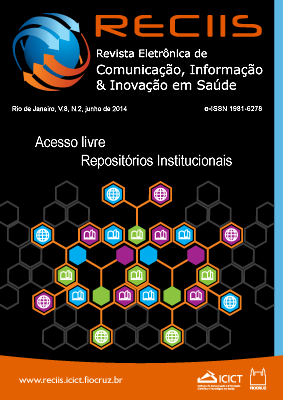Institutional information policy at the University of Sao Paulo to open access to scientific production Cruesp
DOI:
https://doi.org/10.3395/reciis.v8i2.632Keywords:
Institutional repository, Open access institutional mandate, CRUESP Repository of scientific production, Digital library of intellectual production at USP, Portal de Revistas da USP, Policy-making, Portals linked up scientific journals, Open accessAbstract
The Open Access Movement in Brazil is expanding, even though slowly, with more initiatives to create technological infrastruc ture and operational for building institutional repositories than federal and/or state actions providing political and legal support required for its effective consolidation. In this context, it is to be expected numerous difficulties in the institutional policymaking at the universities and research organizations, where the most scientific heritage of the country is produced. Mapping the path that has been followed by Universidade de São Paulo (USP) from the description of distinct and complex strategies, the obstacles and successes to shifting this paradigm and to insert the university in the current setting of open access are discussed. The opportunity for discussion and training composed internally of the teachers, students and staff (especially librarians), the programs and products developed conform to green and gold routes proposed by Stevan Harnad and, finally, the institutional policy for current information are also detailed. In conclusion, the partnership between USP and other universities of the Brazilian state of São Paulo at the request of Fundação de Amparo à Pesquisa do Estado de São Paulo (Fapesp) is described. Such a partnership aims the creation of an integrated portal of open access to scientific publications resulting from research projects financed by that foundation and named Repositório da Produção Científica do Conselho de Reitores das Universidades Estaduais Paulistas (Cruesp). Thus, we think to provide an environment of reflection to other institutions involved in the same and ar duous task of changing the organizational and scientific culture.Downloads
Published
How to Cite
Issue
Section
License
Author’s rights: The author retains unrestricted rights over his work.
Rights to reuse: Reciis adopts the Creative Commons License, CC BY-NC non-commercial attribution according to the Policy on Open Access to Knowledge by Oswaldo Cruz Foundation. With this license, access, download, copy, print, share, reuse, and distribution of articles is allowed, provided that it is for non-commercial use and with source citation, granting proper authorship credits and reference to Reciis. In such cases, no permission is required from the authors or editors.
Rights of authors’s deposit / self-archiving: The authors are encouraged to deposit the published version, along with the link of their article in Reciis, in institutional repositories.












